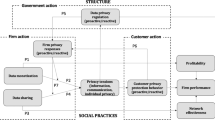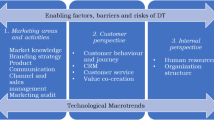Abstract
This article discusses business models as a systemic phenomenon as opposed to traditional reductionistic approaches of business disciplines. It presents the ways connectivity changes economic models due to the availability of consumption data as an economic resource, markets forming at consumption spaces and how industries could disrupt one another when connected through consumption technologies. The article further suggests that the challenges posed by connectivity result in the redrawing of traditional firm and market boundaries. It proposes more research into modularity, transaction costs, the future role of the firm and the necessary transformation of businesses to stay agile in a connected digital economy.
Similar content being viewed by others
Notes
Pictet Search Perspectives, In Conversation with Marc Giget, perspectives.pictet.com/2013/06/19/interview-with-prof-marc-giget/.
References
Araujo, L. and Spring, M. (2010) Complex performance, process modzularity and the spatial configuration of production. In: N. Caldwell and M. Howard (eds.) Procuring Complex Performance: Studies in Innovation in Product-Service Management. London: Routledge.
Baldwin, C.Y. (2008) Where do transactions come from? Modularity, transactions, and the boundaries of firms. Industrial and Corporate Change 17 (1): 155–195.
Besanko, D., Dranove, D., Shanley, M. and Schaefer, S. (2012) Economics of Strategy, 6th edn. Hoboken, NJ: John Wiley & Sons.
Jacobides, M.G., Knudsen, T. and Augier, M. (2006) Who does what and who takes what: Capturing the value from innovation. AIM Research Executive Briefing, December.
Jutter, U., Christopher, M. and Baker, S. (2007) Demand chain management-integrating marketing and supply chain management. Industrial Marketing Management 36 (3): 377–392.
Lampel, J. and Mintzberg, H. (1996) Customizing customization. Sloan Management Review 38 (1): 21–30.
Maglio, P.P. and Spohrer, J (forthcoming) A service science perspective on business model innovation. Industrial Marketing Management. http://dx.doi.org/10.1016/j.indmarman.2013.05.007.
Mollenkopf, D.A., Frankel, R. and Russo, I. (2011) Creating value through returns management: Exploring the marketing-operations interface. Journal of Operations Management 29 (5): 391–403.
Ng, Irene C.L. (2013) Value and Worth: Creating New Markets in the Digital Economy. Cambridge, UK: Innovorsa Press, Printed version 2014. Cambridge University Press, http://valueandmarkets.com.
Ng, I. C.L. and Smith, L. (2012) An integrative framework of value. In: Stephen Vargo and Robert Lusch (eds.) Special Issue on Toward a Better Understanding of the Role of Value in Markets and Marketing, Review of Marketing Research 9: 207–243.
Osterwalder, A., Pigneur, Y. and Tucci, C.L. (2005) Clarifying business models: Origins, present, and future of the concept. Communications of the Association for Information Systems 15 (May): 1–40.
Osterwalder, A. and Yves, P. (2009) Business Model Generation, Self Published. ISBN: 978-2-8399-0580-0.
Shy, Oz. (1996) Industrial Organization: Theory and Applications, 1st edn. Cambridge, MA: MIT Press Books.
Vargo, S.L. and Lusch, R.F. (2004) Evolving to a new dominant logic for marketing. Journal of Marketing 68 (January): 1–17.
Vargo, S.L. and Lusch, R.F. (2008) Service-dominant logic: Continuing the evolution. Journal of the Academy of Marketing Science 36 (1): 1–10.
Yoo, Youngjin, Boland Jr., Richard J. and Lyytinen, Kalle (2012) Organizing for innovation in the digitized world. Organization Science 23 (5): 1398–1408.
Zott, C., Amit, R. and Lorenzo, M. (2011) The business model: Recent developments and future research. Journal of Management 37 (4): 1019–1042.
Author information
Authors and Affiliations
Rights and permissions
About this article
Cite this article
Ng, I. New business and economic models in the connected digital economy. J Revenue Pricing Manag 13, 149–155 (2014). https://doi.org/10.1057/rpm.2013.27
Received:
Revised:
Published:
Issue Date:
DOI: https://doi.org/10.1057/rpm.2013.27




